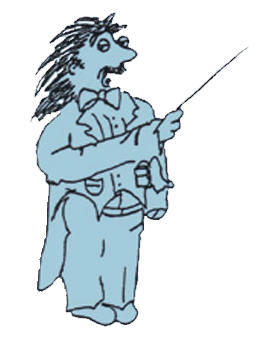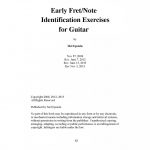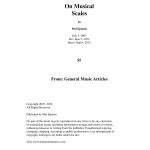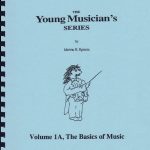What follows are a number of specific points about the music instructor/student relationship that I have discovered over my years of teaching.
1. The instruction process can only work well when the student is personally involved in improvement in their musical skills. If this involvement truly ends, so should the instruction.
2. Learning to play a musical instrument is comprised of many individual steps. Results typically appear gradually and periodically, and only after much specific practice. Regularity of lessons and practice sessions significantly contribute to bringing about these results.
3. Practice between lessons is essential to advancing, as gaining musical skill requires a continuous effort. The student must clearly understand this and commit to it. See my “Practice Tips” for helpful tips and techniques towards this end.
4. Responsibility for getting down to actual practice ultimately rests with the student. Developing a practice plan at the start of this venture is a good way to help ensure that routine practice actually takes place.
5. I will always try, in each lesson, to assign just the correct amount of material to be practiced for the next lesson. Sometimes, I will note that items are optional. Optional items should be worked on, if the prior material is all pretty well in hand. If the assigned material altogether is more than can be handled before the next scheduled lesson, the student should work hard on what he/she can in the available time.
6. I will determine the selection of materials and their order of inclusion in each student’s learning program. This means as well that I reserve the right to exclude suggested materials. So, a parent wanting to implement his or her own music education plan needs to understand and accept this.
Please inform me of any manual, emotional, cognitive or learning exceptions that apply to yourself. Knowing this information will help immensely in my working with you.
7. If the lesson is being delivered at your home, please arrange for the environment to be relatively quiet throughout the course of the lesson.
8. If you wish to cancel a scheduled lesson, you need to do so not less than one day in advance of the scheduled date to avoid paying the lesson fee. As each of my workdays is built of a planned sequence of lessons and locations, a sudden drop out of a lesson leaves me insufficient time to rework my schedule.
9. If a lesson has been scheduled, you should assume that the lesson will occur, at the usual site, at the scheduled time, unless either you or I have explicitly canceled it.
10. Given enough advance notice and availability of time, I will reschedule a lesson whenever possible.
11. Lesson rates are subject to occasional (but infrequent) increase.
12. Prepayments are not refundable.
13. If lesson cancellations become frequent, then you will be required to pre-purchase a block of lessons (namely, four at a time), none of which may be cancelled. After the block is used, you may revert to the original payment Policy.
14. Unfortunately, sometimes, the relationship between the student and myself does not work out well. In those instances, I reserve the right to end the teaching activity. You also have the same right.
If the relationship ends by your choice, I request payment through the end of the current month. I do this so as to give me allow me time to reorganize my schedule. If the relationship ends by my choice, there is no expectation of further payment.
15. No alcohol may be consumed during the lesson.
16. Try to be well rested at the time of each lesson.
17. I will be as imaginative and appropriate a music instructor for each of my students as possible.
6/18/1998
Updated 1/5/12






